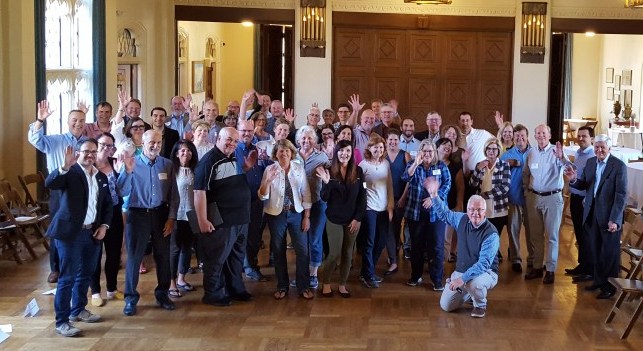
The recent Ethics and Engineering Change Lab explored key questions of ethics, entrepreneurship, and technological stewardship.
When it comes to projects with the potential to have a major societal impact, such as the development of autonomous vehicles, whose job is it to ensure that all ethical dimensions are considered? How effectively is engineering education preparing new and recent graduates who will be developing potentially world-altering technologies? What kind of forums should exist to help people in industry, academia, and the general public communicate about and act on the potential risks and problems involved with emerging technologies?

These were some of the big questions considered at the Canadian Engineering Change Lab’s 14th workshop and the first joint summit with the United States Engineering Change Lab. The summit took place in Berkeley, California, from June 15 to 17, 2019, and involved about 70 participants. Beryl Strawczynski, Manager, Regulatory Research and International Mobility, attended on behalf of Engineers Canada to observe and learn about the conversations and what impact they might have in the future on the engineering profession and its regulation.
The workshop’s first day centered around questions of ethics. Speakers from national and state-level engineering organizations as well as private enterprises framed discussions with topics ranging from unconscious biases in the engineering design process to the present challenges of maintaining a meaningful regulatory environment. One particular issue explored by the group was the question of whether technology and society are separate. If they’re considered to be one and the same, panellists asked, then doesn’t the engineering profession have a greater responsibility to seek perspectives beyond its own particular expertise when developing powerful new technologies?
On the workshop’s second day, speakers from academia and industry discussed the entrepreneurial environment and the effects it’s having on questions of ethics. Several discussions explored ways to apply entrepreneurial frameworks to address social problems. They also spoke on the importance of purpose- and mission-driven organizations in creating an ethical entrepreneurial environment. Looming over this imperative are the challenges such ethically-oriented companies face when confronted with monopoly markets and consumer pressures that do not necessarily create an ecosystem that promotes this sense of responsibility.
The Canadian participants had an extra day to visit with organizations involved in the promotion of STEM, applied engineering, and ethics. At one of the venues visited, the Stanford Technology Ventures Program, Canadians heard about efforts to integrate ethical learning throughout the program’s curriculum, rather than treating it as a single, stand-alone course. Aspiring entrepreneurs in the program, for example, learn about ethics at the ground-level by developing their own business’ values and principles as part of their course work. Presenters also discussed the need to include multiple departments in discussions about entrepreneurship and ethics—by including approaches and viewpoints outside engineering, businesses effectively protect themselves against risks and tap into unforeseen benefits.
Several critical themes emerged from the workshop. Among these, was the daunting question how engineers can focus on developing technologies that are as beneficial as possible to society as a whole. On a related note, many conversations also circulated around the risks of defining problems in such a way that pre-determines their technological solution. Even after a considerable amount of thought-provoking discussion, questions still remained about how best to apply the insights people gained. To recognize the issues is one thing—to ensure that this recognition informs engineering practice and policy is quite another.

